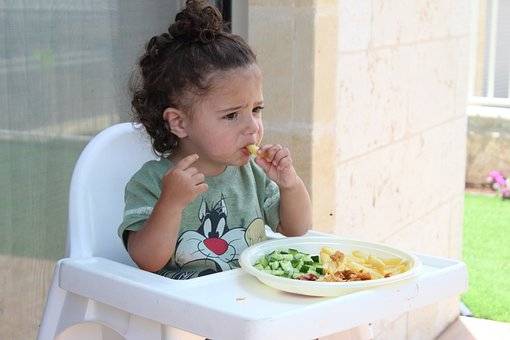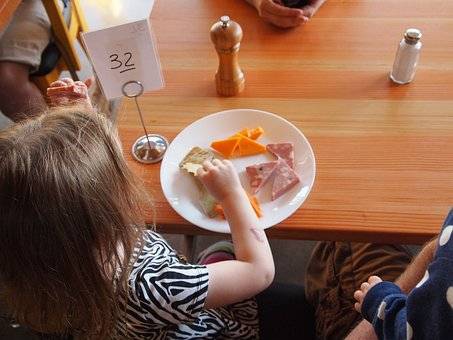Have you heard the saying, “It is all about the food,” well, if not, there is always a first time! Food, especially a person’s eating habits, has much to do with personality development and psychological tunings. Research suggests that children face early satiety when forced to eat. There have also been cases of depression, social anxiety, and general anxiety among children with a controlled eating atmosphere during their pre-adolescents. So are you someone acting strict on their child, not allowing them to leave the table until they finish off the plate? Unknowingly, you might have got your hands on force-feeding and stand as the reason for planting the seed of anxiety within your child.

Such behaviors can be undone, and your child has a bright future waiting, but how? You will have to read through and get to know it.
Key Takeaways
- A child’s immediate environment has much to do with their food preferences.
- Food pushing and force-feeding are counterproductive and can turn harmful over time.
- Items with high levels of fat content are termed palatable, but these are low on nutritional levels on the other side.
- Parents who are too persuasive/restrictive about food end up indulging their children in uncontrollable eating habits. Instead of caring for themselves, these kids are more concerned with revolting against their parents’ choices. And start to intake unhealthy foods, which their parents disapprove of.
The Basic Theory Of Food
The human body cannot sustain itself without food, making it an essential part of our daily lives. The theory of food revolves around the idea that, at times food work as a mood lifter. Also, the basics keep changing depending on an individual’s dietary habits and the table manners they have grown up with.
This brings up the child’s growing years and the level of intervention from the parents as the prime deciding factor for the theory. The more restricted a person’s childhood is, the more debatable the psychological bonding they will have with food.
Psychological Take
Most parents, out of concern, end up nagging, controlling, or force-feeding their children. However, they fail to understand that all these add up, initiating anxiety and trauma with food and their parents’ overall behavior in the child’s mind.
According to research, children forced to eat end up eating bigger portions than the regular or often get rebellious and pick up otherwise unacceptable tantrums. In the long run, this act of force-feeding causes the child to lose their ability to self-regulate day-to-day eating habits. The natural sense of fullness gets dulled, and the child finds comfort in junk food growing up.

It has been noticed that grown-up adults dislike certain foods’ smells and tastes because they were forced to eat that items as a child. This brings us together with the term “early satiety” or “early fullness.” Here, the person in concern gets picky and starts showcasing hatred towards a lot of food which ultimately causes them to miss out on essential nutrients.
Also, force-feeding your child can lead to them becoming “emotional eaters” or showcasing symptoms of stage 1 depression/anxiety due to the pressure they face. In many cases, children did start getting scared of their parents and emotionally drifting away.
Damage Control
It is understandable that you, as a parent, only want your kid to grow and get everything healthy. That made you behave in such a way, and now you are resentful. Don’t worry; the damage can still be amended, and you and your child can look forward to a new start.

Let Them Decide
For your toddlers, come up with a weekly meal plan for all the times in a day they eat; just like that, you will be able to figure out the food they like. In case you are dealing with a child between 7-13 years of age, it’s high time you must ask for their preferences when it comes to food.
Remember, the more involved you make them feel, the better they will be in taking charge in the future. This also adds up to their personality development and goal orientation.
Use Positive Feeding Practices
Rather than forcing your child to eat, sit down with them and have that food yourself. Narrate stories, talking about the nutritional value of the same. Also, stop asking them to try out the meal. Instead, let them decide on their own.
When you allow your child to make decisions independently, they become more confident and will make the right choice regarding food.
Work On The Nutrient Level And Portion Size
As a parent, you are more experienced in the nutrient composition of every food. So use your learnings and prepare a menu accordingly. Do not introduce your child to unnecessary junk food.
Make them understand the value of food and serve little portions from time to time. Also, as a parent, you must follow similar healthy habits, acting as a role model for your kid to believe in.
Taste Is Important
You must remember that the subject in concern is only a kid and not a grown-up adult. So rather than punishing them or being strict towards the same, you can be a little compassionate and let the magic happen.
Start preparing nutrient-rich tasty food for your ward and let them enjoy the meal as served. As already discussed, come up with mealtime stories describing the nutritional value of every nibble served. It takes time to develop a taste, but you are set for a lifetime.
Maintain A Fixed Hour At The Table
Maintain a fixed lunch and dinner schedule, and keep your cell phones away while eating. Focus on knowing about each other’s day and practicing the habit of conversation. Your child from a very young age must get your full attention.
This will help you encourage growth as a family, where your child is no longer shying away or suffering alone. Food is just a medium. The main aim shall be you helping your offspring in 360-degree character development.
Your child must feel safe at home. The first level of bonding between a mother and her child starts with food. Things get a lot easier when you allow your child to fulfill their wants by being in control. In the long run, your child will look at you as their safe place and never choose to be aloof or alone, acting distant all the time.



